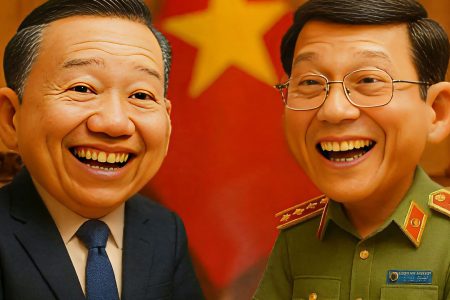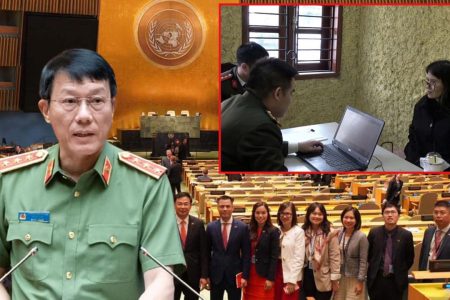Vietnam’s highest legislative body National Assembly (NA) in the 14th tenure is conducting its 9th month-lasting session which started on May 20 and expected to end on June 18.
This is the first time the NA’s session is being held online and delegations from 63 provinces and cities are staying in their localities and connected with the center in Hanoi as a measure for Covid-19 infection prevention.
This is also the session where no Questions-Answers but legislators can give their questions and the concerned government officials are requested to answer in written form.
Earlier, NA’s Chairwoman Nguyen Thi Kim Ngan said: “This is not a meeting to criticize government’s agencies regarding specific issues but to conspire, present and to restore social and economic life of the people.“ This statement has shown her view of previous sessions, causing the public to be concerned about the views and visions of the chairwoman of the parliament’s sessions.
A number of topics of interest to voters are being addressed at the meeting.
Notably, in the verification report assessing the results of the implementation of the NA’s Resolution on socio-economic development plans in the first months of 2020 at the opening session of the meeting on May 20’s morning, Chairman of the Economic Committee Vu Hong Thanh said that he would propose to evaluate the situation and solutions to protect the country’s sovereignty in the East Sea (South China Sea).
Thereby, the Economic Committee proposed to closely monitor international political developments, especially the strategic competition between major countries, including trade and epidemics. Strengthening foreign affairs, proactively implementing measures to firmly protect the sovereignty of sea and islands, borders.

Lawyer Hoang Viet said: „Firstly, in my opinion this move shows the interest of the people in general and through the opinion of the people, they come to the legislators.“
„And not once, but many times, the NA has spoken out on this issue, but once, when Nguyen Phu Trong was the chairman of the parliament, he said that ‚the situation in the South China Sea is nothing new’.”
„So this time, with the NA continuing to raise and demand this issue, it shows the growing people’s interest in the South China Sea issue.“
“And also especially because the South China Sea issue is becoming more and more tense due to China with their power, they are continuing to expand their very disturbing actions in the sea.“
An important content at this meeting is the ratification of the Vietnam – EU Free Trade Agreement (EFVTA) and the Investment Protection Agreement (EVIPA).
On March 30, 2020, the European Council approved a decision to ratify EVFTA.
Earlier, human rights activists in Vietnam had actively urged the EU to postpone approval when Hanoi has not yet met the human rights commitments. Congressman Anna Cavanizzi is one of the EU’s legislators who voted against for many reasons, one of which was raised by her: „The situation of human rights in Vietnam is extremely worrying. Despite the promises, the situation is not better: Vietnam has launched a brutal crackdown on dissent and organized labor, especially since 2016.”
Besides, there is another viewpoint represented by the perspective of Mr. Geert Bourgeois, reporter of the EVFTA, who believes that: “The adoption will boost further progress for Labor Standards, Environment and Respect for Human Rights.“
At this session, on the afternoon of May 20, legislators were discussing the ratification of the EVFTA, many suggestions in the Government’s Action Program to implement the EVFTA the government should: (i) be more specific the legalizing the commitments to implement the Agreement. Pay more attention to policies for small and medium enterprises, improve the transparency and transparency of the investment environment; (ii) Continue to carefully assess the impact of the Agreement on Vietnam; building measures to improve competitiveness, develop human resources; compare the impact of the EU market with Vietnam in relation to other markets to ensure the independence of the economy, political institutions; (iii) Promote and innovate the content, form of information and propagation of the agreement’s content, which focuses on the subjects of enterprises, state management agencies, and facilitates support and advise enterprises on the effective implementation of the agreement.

In 2019, economic expert Pham Chi Lan recommended at many conferences on institutional constraints, mainly stemming from the lack of clarity in the requirement to build a socialist-oriented market economy. This makes managers hesitant about the movements of the market economy, because they themselves do not know what is “socialist orientation.”
Ms. Pham Chi Lan justified: “From the ambiguities in the regulation, it leads to limiting transparency and fairness in management, creating loopholes for petty corruption. Therefore, when businesses should be operating on a competitive advantage, businesses have to spend resources to strengthen their position in relations with government officials, so it is easy to find the legitimacy of aspects that the law doesn’t clarify.
In addition, the State’s investment resources themselves have not been allocated appropriately, contrary to the development rules of the market economy. The pressure of ‘socialist orientation’ makes the allocation of resources focused primarily on state-owned enterprises, regardless of efficiency while the rule of market economy is efficiency.
With EVFTA, openness, transparency and anti-corruption are important factors that Vietnam has signed and must implement. This of course brings legitimate benefits to the countries participating in the agreement, but also the expectations of the Vietnamese people.
If Vietnam can fulfill its commitment, the biggest beneficiary will be the Vietnamese people. Meanwhile, all resources of the economy will focus on development. Vietnam will have movements closely following the market mechanism and modern civilization, from which there is a foundation to go higher. Otherwise, all hopes of raising the nation still lie in the statistics and the volume of exports that focus mostly on FDI enterprises. And Vietnam is still hanging around in the role of outsourcing, in the scenario of falling seasons, in pursuing short-term goals, producing poor quality products.”
Two other topics were equally concerned: the first was Judicial Supervision and Ho Duy Hai case; The second is the People Voluntary and Dong Tam incident.

Chairing the international press conference on May 18 about the expected agenda of the 9th session, NA’s General Secretary Nguyen Hanh Phuc acknowledged that a number of legislators had submitted their comments to NA’s Standing Committee to provide opinions and recommendations on the case.
He said: “The process also shows that Ho Duy Hai’s family constantly complains and complains. Local and international public opinion is also very concerned. Currently, the NA’s Standing Committee is assigning specialized agencies to research and handle in accordance with the law.”
With many years of experience in the position of deputy chairman of the NA’s Office, Mr. Tran Quoc Thuan said that in recent years, at least his term of office until now, he has not seen the Standing Committee has issued a verdict to promote the court. He said: „If necessary, the NA raises the issue and request but does not give anything to the Council of Judges of the Supreme People’s Court to meet again or adjudicate the case again. That possibility is possible in that form. If so, it will be a huge loss to the Vietnamese judiciary.”
Hoang Viet also said: “Although in theory, the NA plays an important role as supreme supervision, but in reality, this ability has not been implemented much. If this time the parliament requires judicial supervision, it is a step to meet the demands from the reality of the country’s life.”
In the program of the opening session, on May 20, the Central Committee of the Vietnam Fatherland Front, and the NA’s Committee of People ’s Petition presented and reported a number of issues on voters‘ wishes.
–
Legally, the NA is the highest representative organ of the people; the highest State power agency of the Socialist Republic of Vietnam; is the only body elected by the voters nationwide on the principle of universal, equal, direct and secret suffrage. Legislators are elected by voters at constituencies, and are responsible before their own electorate and the national electorate.
The NA has 3 main functions: the legislative function; function to decide important issues of the country; supreme supervision function for the entire operation of the State.
However, the NA has long been considered a puppet parliament, ignoring the aspirations of the people and only serving the interests of the ruling Communist Party that incumbent Chairman Nguyen Thi Kim Ngan has revealed, when the Special Economic Zone bill was unexpectedly presented to the NA in May 2018 without any prior notice, a number of legislators had an attitude of wonder and reaction. In response to that deceitful behavior and the consequences that the Special Economic Zone could be approved, Ms. Ngan immediately ‚blocked others’ mouth by saying “The Politburo has approved the Special Economic Zone bill already... ”
Thoibao.de (Translated)


























